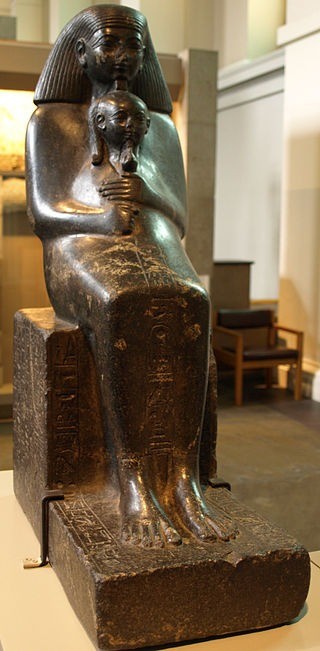Senmut

What a mysterious character this Senmut is!
We know much if not all of his public life, of his ascent to the most important posts that could be obtained from the pharaoh. We even have the graves of his parents, found intact.
What we don't really know is how he could get so high in the political hierarchies of the time, starting from practically nothing. We have already reported we have found the graves of his parents and in them the father is simply called worthy and the mother has the title, very vague to tell the truth of "mistress of a house". Historians agree in considering all this a more than evident proof to be able to affirm that Senmut was of poor origins.
Yet, in a very few years, this mysterious man obtained from the queen so many favors that he became the most important dignitary at the court of Hatshepsut.
Historians, in this case more like gossip wives than serious reseachers, have hypothesized a close personal relationship between Senmut and Hatshepsut, to put it down to earth it is believed that Senmut was the queen's lover. Some, more enterprising, even think that he is the real father of Hatshepsut's two daughters!
None of the ten statues depicting Senmut even remotely suggest that there has ever been such a relationship. It is true, however, that they show the existence of a particular bond between the great dignitary and Neferura, the queen's daughter (in six of the ten statues they show Senmut embracing the princess), and I do not think the explanation that Senmut is enough he was the tutor or even the tutor of the princess.
These statues are also the only proof that leads to revise the hypothesis, which is now considered the most reliable, of a brief parable of the dignitary's fortunes, as Neferura is represented, beyond the usual stylization of Egyptian artistic works, as a very young child and, from other documents, it is known that he held this prestigious post until the princess came of age.
But just as his rise was extremely rapid so too the end of his glory had to be just as sudden and all this was caused by a painting!
If you enter the "sancta sanctorum" of the temple of Deir el Bahari you will be able to see a scene of adoration: the kneeling figure who pays homage to the queen's father is Senmut. The king could allow one of his most faithful servants to place a statue of him in the temple, but in many centuries it had never happened that an official used the king's mortuary temple to obtain the religious services that were proper to the pharaoh.
Yet Senmut had been very careful: the doors of the Egyptian temples were always opened from the outside inwards, and the scenes of adoration were so invisible as they remained covered by the doors.
It is not known how the reliefs were discovered, but it is certain that the deception was discovered and the images chiseled, but as often happens in these cases the work was done negligently and four images remained intact.
The ensuing scandal caused Senmut to fall out of favor and he was effectively relieved of all of his posts, but some data in our possession suggests that Senmut still held some secondary posts.
It can be believed that the scandal forced the queen to publicly "reproach" her most faithful servant, but also that in the secret of the palace he remained the queen's confidant, but there are no documents that allow to shed some light on this extraordinary character. !

















